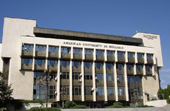
Path to Europeanization
By Ekaterine Tchelidze
Monday, December 30
I am Ekaterine Tchelidze, 20; born in Tbilisi I had lived here for 18 years. Right after graduation from high school in 2011 I moved to Bulgaria to pursue higher education at the American University (AUBG) there. It is located in Blagoevgrad, a tiny town in southwestern Bulgaria. It was quite difficult for me to adapt to a new atmosphere, not having noisy cars and busy people, constantly rushing somewhere, around. Eventually, I got used to peace and quiet around me and, ironically, become annoyed by all these lively surroundings in Tbilisi, every time I visit my hometown.
I am currently a junior, majoring in Journalism and Mass Communication with minor in Literature. I also write and report for university media. I have always been passionate about writing and reading, thus I chose my profession accordingly. After graduation I am planning to continue my education in Journalism School somewhere in Europe.
Developing states constantly experience changes in political, economic and social sense. Such alterations are gradual; thus, they are not promptly noticeable to citizens. It is different for someone who has not lived in the country for three years. What should one expect from a long-awaited trip home? What challenges and surprises should one be prepared for?
I left Georgia three years ago due to lack of opportunities in the country; and moved to Bulgaria in order to pursue high quality education in the American University, Blagoevgrad. I have lived in Tbilisi for 18 years and being surrounded by people who shared common views on politics, traditions and social life, I have never had different cultural experience. Moreover, it is hardly plausible to notice any changes in the country while continuously living there.
It is fair to say that visual change takes the first place among other categories that overcome gradual development. Three years ago Georgia seemed gray and gloomy with solid facades of unattractive buildings. Back then it looked quite similar to what I later encountered in Bulgaria.
Bulgaria is one of the poorest countries in the European Union. This fact justifies the abundance of old Communist buildings and trams from the 50s in the capital of Sofia. Georgia disclaimed the use of trams in the beginning of XXI century; however old constructions were still abundant not only in the capital, but also in provinces. Today, one can barely find any of these in the country anymore. Modern skyscrapers partially replaced old constructions and identical minibuses exchanged old means of transportation. Residual elements, which did not undergo modern changes, perfectly harmonize with modified details, creating peculiar contrast.
The fact that firstly caught my attention was excessive number of tourists in the capital. It is heartwarming to meet people not only from post-Soviet countries, but also from various parts of the world in the center of Tbilisi, exploring Georgian culture and tasting national cuisine. Abundance of mixed languages prevailing in the capital creates a certain sense of Europeanization. Such changes are gradual; thus, they are unnoticeable to the accustom eye. However, they immediately strike attention of a newcomer, or somebody, who has not lived in the country for long. During the past three years Georgia has undergone drastic changes in cultural development. This led to a notable improvement of tourism. Nevertheless, the country still has to overcome certain reforms in order to reach a level of complete modernization. Social change and ability of acceptance should have the leading role in the country’s Europeanization. The first aspect that one notices when travelling to Europe is that people there do not pay attention to each other’s appearance, religious beliefs or orientation. Even Bulgarians, who are quite conservative in certain aspects, do not judge someone’s style and the way of thinking. It is different in Georgia. Although democracy is the ruling regime in the country, it feels that citizens’ mind is still bound by conventional reasoning. Europeans have the freedom to live the way that makes them comfortable the most. While in Georgia, one gets suddenly constrained to follow common rules and appreciate common knowledge. Any deviations from the “common” are exposed to public judgment. Unlimited conservatism is one of the flaws of the ingenious way of thinking and it is unnoticeable unless one experiences diverse attitude.
Social development requires relatively more time and adjustments, since it is the common way of thinking that should be exposed to alterations. While citizens are still on their way to such drastic changes, economic and politic developments are observable. Rapid growth in tourism and economy is appreciated not only by the locals, but also by foreigners overseas. There is also abundance of Georgian production on the European market in comparison to early years. In addition to that, cultural exchange is well-established, leading to annual performances of Georgian actors and dancing ensembles in various European capitals.
Overall, as mentioned before, economic situation as well as visual representation of Georgia has changed to the better over the course of three years. Moreover, quality of medical treatment has also increased in a short period of time. Modern equipment and well-qualified professionals provide patients with good service. Furthermore, various insurance opportunities are of good help for citizens with average income about 600 GEL a month. However, there is always room for improvement. This includes availability of job vacancies, higher income and better quality of education. It is worth mentioning that the state still has to be open for social changes, which mostly depend on citizens’ willingness to alteration. Such improvements are necessary in order to prevent young generations from emigration.


